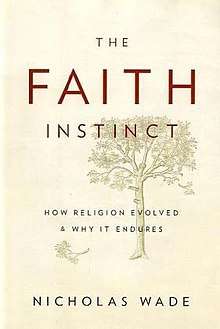The Faith Instinct
 | |
| Author | Nicholas Wade |
|---|---|
| Country | United States |
| Language | English |
| Subject | Human evolution, social evolution, human history, sociobiology, evolutionary psychology |
| Published | 2009 |
| Publisher | Penguin Books |
| ISBN | 978-1594202285 |
The Faith Instinct: How Religion Evolved and Why It Endures is a 2009 book by New York Times science reporter Nicholas Wade, about the evolution of religious behavior, that argues religious behaviours have evolved through natural selection and shares similar evolutionary origins with other forms of collective behaviour in animals, primarily tribal behaviour . In the book Wade argues that religious behaviour, through shared gods and beliefs, music and dance that creates social solidarity, is the driving force in making groups of people who are not related to each other by family, comply with and enforce shared norms and rules for social behaviour that are necessary for societies to function, thereby allowing humans who are not related to each by family to function together in a civilization.
Wage argues that the selection for religious behaviour began at least 50,000 years ago between african tribes, where tribes that benefited more from the unifying power of shared gods and beliefs, music and dance, outcompeted rivals and thus left more survivors, whereby genes underlying a brain-based “faith instinct” proliferated, which caused religious tendencies to be ingrained in the human brain.